During the pandemic of COVID-19, some negative findings were reported regarding children's mental health; accordingly, it was revealed that the pandemic was having a significant impact on children's well-being. In this context, Child Research Net (CRN) formulated and conducted a collaborative international survey with researchers and educationists from eight Asian countries. The theme of the survey was to investigate factors nurturing children's well-being even under unpredictable difficulties such as the pandemic. In particular, we focused on "resilience," the capacity to adapt and recover from adversity.
In this article, we will report on the progress of our independent symposium titled "Exploring Factors Nurturing Children's Resilience and Well-being" based on the Results of the "Survey on Children's Daily Life among Eight Asian Countries 2021" at the 34th Annual Meeting of the Japan Society for Developmental Psychology held on Saturday, March 4, 2023.
Research Objective
A collaborative international survey with researchers from eight Asian countries, taking advantage of the collaborative relationship established before the COVID-19 pandemic Yoichi Sakakihara
Yoichi SakakiharaDirector of Child Research Net (CRN), Professor Emeritus of Ochanomizu University
Child Research Net promotes interdisciplinary and international research studies and discussions to find solutions for various issues affecting children worldwide. We also collaborate with researchers from Asian countries in our research studies. Even during the pandemic of COVID-19, we regularly communicated online with these researchers, where we found there was a common and strong interest in the impact of the pandemic on children's well-being. Numerous previous studies have proved that children have a psychological ability named resilience, one of the psychological traits and the ability to withstand, adapt to, and recover from adversity. However, during the pandemic, children seemed to be significantly affected by their parents' stress in addition to their own.
Therefore, we conducted a collaborative international survey on children's daily life, focusing on the factor of resilience, to ascertain how societal factors impact children's lives. The participating countries included Japan, China, Taiwan, Indonesia, Malaysia, the Philippines, Singapore, and Thailand.
Survey Overview| Title: | Survey on Children's Daily Life among Eight Asian Countries 2021 |
| Purpose: | To clarify the environmental factors for nurturing "Happy and Resilient" children from the three environmental perspectives of families, childcare facilities/schools, and the government/society, in order to enhance "children's well-being" even under the time of hardship during the COVID-19 pandemic. |
| Sample: | Mothers of 5-year-olds (preschool children) or 7-year-olds (elementary school children) |
| N.B. In this symposium, we mainly reported on the survey results of 5-year-olds. | |
| Participating countries: | Japan, China, Taiwan, Indonesia, Malaysia, the Philippines, Singapore, and Thailand |
| Number of valid responses: | 1,973 mothers of 5-year-olds (preschool children across 8 countries) |
| 1,372 mothers of 7-year-olds (elementary school children across 6 countries; China and Singapore are omitted) | |
| Method: | Questionnaire survey (online/paper) |
| Survey period: | August to November 2021 |
| Measurement of well-being used in this survey: | KINDL scale (developed by Ravens-Sieberer & Bullinger) |
| Measurement of resilience used in this survey: | PMK-CYRM-R scale (developed by the Resilience Research Centre in Canada) |
| *The data analysis in this document is based on unmodified raw data collected. | |
[Occupation]Most mothers were in employment in six of the countries, apart from Malaysia and Indonesia. In Japan, more than 80% of mothers of five-year-olds and about 60% of mothers of seven-year-olds were in employment.
[Academic background]Most mothers had completed higher education in six of the countries besides Malaysia and Indonesia. In these two countries, most mothers of seven-year-olds had completed secondary education. In Japan, about 70% of mothers of five-year-olds and more than 80% of mothers of seven-year-olds had completed higher education.
[Household income]Middle-range income was most prevalent in the Philippines, while lower-range income was most common in Malaysia. The household income levels in the other six countries were relatively evenly distributed. A large number of mothers in Indonesia chose the answer "Do not know/do not want to answer." In Japan, about 80% of households (for both five- and seven-year-olds) answered "Middle range income" or "Upper range income."
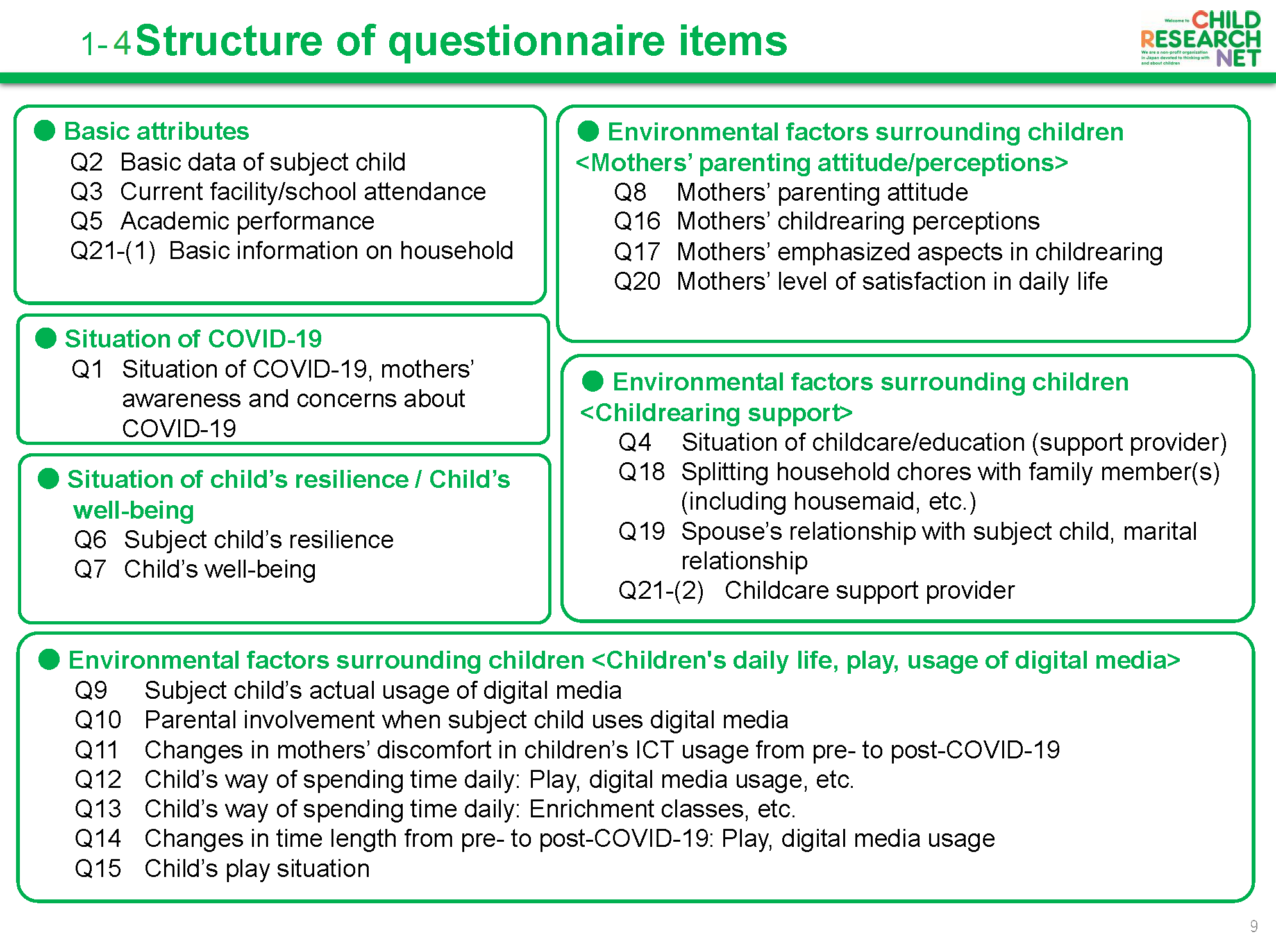
For more information on survey results, please click here.
Symposium Topics
[Topics]- Overview of children's daily life and mothers' childrearing perceptions among eight Asian countries
Seiko Mochida (Researcher at Child Research Net (CRN) and Senior Researcher at the Benesse Educational Research and Development Institute) - The development of children's well-being and resilience during the COVID-19 pandemic
Junko Ogawa (Researcher at Child Research Net (CRN) and the Benesse Educational Research and Development Institute) - Focusing on parental involvement in children's use of digital media
Tomomi Sato (Professor, Faculty of Human Informatics, Aichi Shukutoku University)
- Exploring factors associated with children's resilience and well-being among eight Asian countries
Chieko Kibe (Lecturer, Center for Institutional Research, Educational Development, and Learning Support, Ochanomizu University)
- Regarding survey methods, results, and future prospects
[Topic 1]
Overview of children's daily life and mothers' childrearing perceptions among eight Asian countries Seiko Mochida
Seiko MochidaResearcher at Child Research Net (CRN) and Senior Researcher at the Benesse Educational Research and Development Institute
Children in Japan are more likely to spend long hours on indoor play and digital media viewing instead of playing outdoors
In this section, I will report on the actual situation of children's daily life and their mothers' educational perceptions based on the descriptive statistics of the answers collected from mothers of five-year-olds.
During the survey period, most children attended childcare facilities as usual in Japan, China, Taiwan, and Singapore. In contrast, the governmental stay-at-home policy was more strictly imposed in Indonesia, Malaysia, the Philippines, and Thailand, obliging most children to stay at home or receive a hybrid-style education (i.e., a combination of face-to-face and online learning). Under such circumstances, when looking into the major activities of five-year-olds during a typical day, Japanese children spent fewer hours on outdoor play, home study, and digital media viewing than children in other countries. Of course, the actual time spent may vary depending on each child, but children in Japan seem to have fewer hours after school until they go to sleep (Figure 1). Overall, mothers in most countries answered that children spent fewer hours on outdoor play and longer hours on indoor play and digital media viewing compared to before the outbreak of COVID-19. In the case of Japan, however, more than 40% of mothers answered "Has not changed" regarding children's outdoor play; therefore, children in Japan might primarily spend fewer hours on outdoor play than children in other countries without regard to the pandemic.
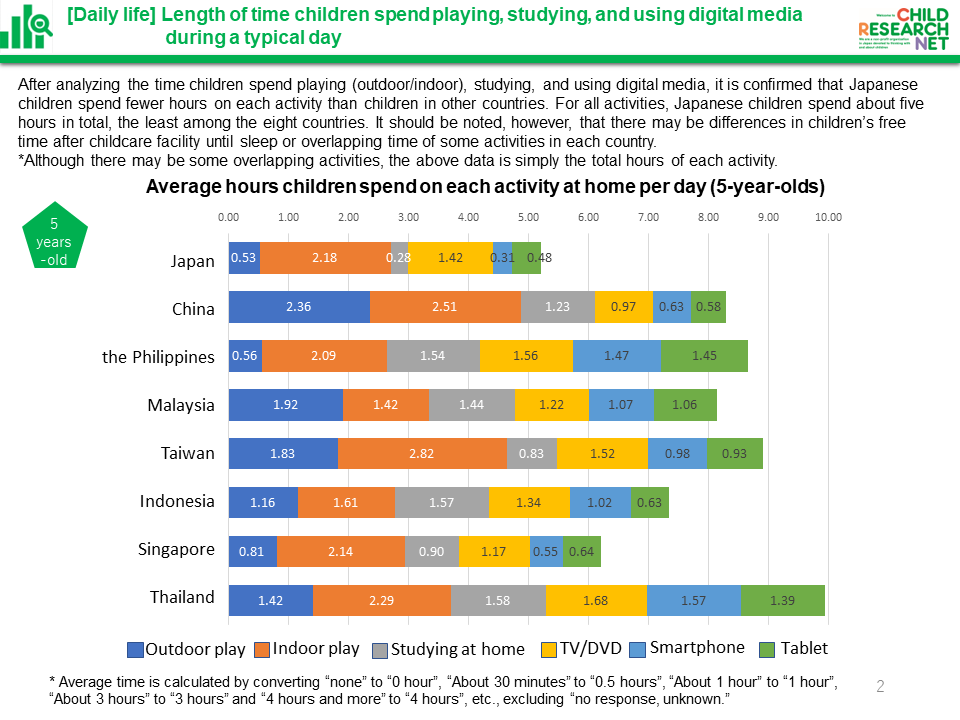
* Although there may be some overlapping activities, the above data is simply the total hours of each activity.
Regarding children's playmates, most children in Japan play with "friends from the childcare facility or school," "parents," and "siblings." In contrast, more children in China, Indonesia, Singapore, and Thailand play with "friends in the neighborhood." Meanwhile, screentime increased in all countries during the pandemic. However, regarding the purpose of use, only five out of 13 items were chosen by more than 50% of the respondents; therefore, the purpose of use seems relatively limited in Japan.
When analyzing correlation between the various activities of five-year-olds and their physical well-being across eight Asian countries, a weak positive correlation was confirmed for "outdoor play" and "indoor play."
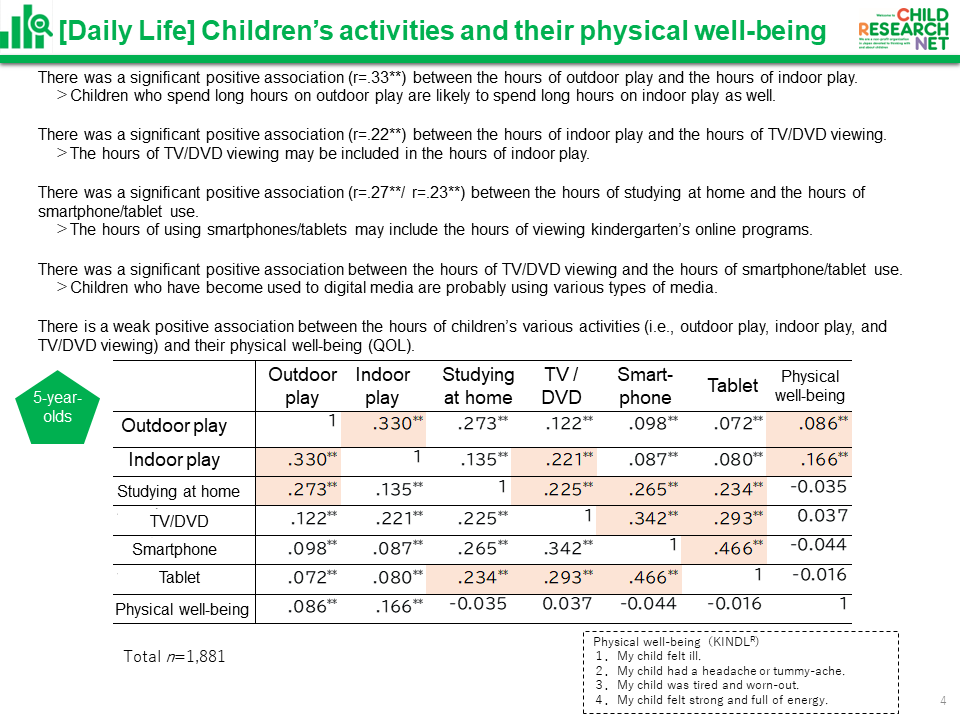
Mothers' positive parenting enhances children's well-being
Next, we will examine Japanese mothers' child-rearing perceptions. Compared to mothers in other countries, mothers in Japan put less emphasis on "Give the child opportunities for nature experience," "Help the child learn numbers/letters," "Let the child play with friends," "Foster the artistic talent of the child (music, painting etc.)," "Help the child value tradition/culture," and "Help the child learn foreign languages."
Regarding "the spouse's support" and "mothers' parenting satisfaction," the scores of Japanese mothers are significantly lower than those of mothers in other countries. Previous studies indicated that mothers' parenting satisfaction is affected by their spouse's physical and emotional support in childrearing.*1 This survey also shows a significant positive association between mothers' parenting satisfaction and fathers' support for housework/mothers' emotional health in all countries apart from the Philippines.
We conducted a multiple regression analysis on "mothers' parenting satisfaction" and "the spouse's support." In Japan, China, Malaysia, Taiwan, and Indonesia, higher scores for mothers' satisfaction with childrearing are predicted by their spouse's support for housework and mothers' emotional health. However, it is also confirmed that, for Japanese mothers, their parenting satisfaction is negatively associated with the frequency of the spouse's support for childcare.
Finally, "children's family-related QOL" significantly predicts mothers' parenting satisfaction in Japan, China, and Thailand. In addition, "children's resilience" significantly predicts mothers' parenting satisfaction in Taiwan, Indonesia, and Singapore. Therefore, it is confirmed that children's personal qualities are related to their parents' parenting satisfaction in some countries.
The above analysis results indicate that mothers' positive attitudes and parenting satisfaction are related to their children's family-related well-being and resilience. In addition, mothers' parenting satisfaction can be enhanced by the spouse's emotional support as well as support from childcare facilities/schools.
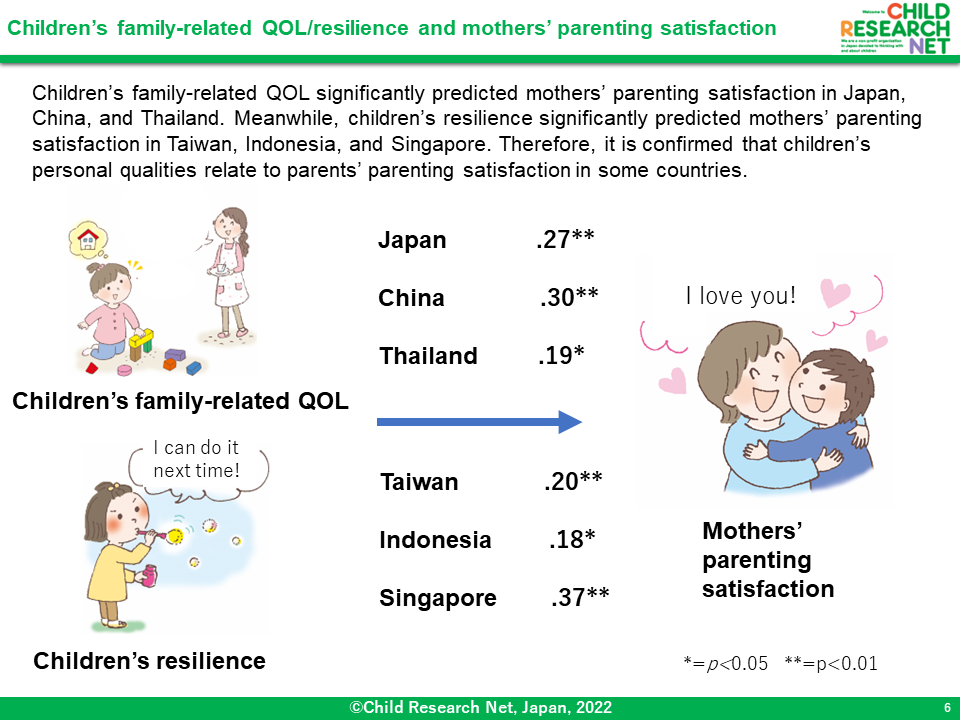
[Topic 2]
The development of children's well-being and resilience during the COVID-19 pandemic Junko Ogawa
Junko OgawaResearcher at Child Research Net (CRN) and the Benesse Educational Research and Development Institute
Children's well-being is assured by strong resilience in all eight countries
To clarify the relationship between children's well-being and resilience, we analyzed the data from mothers of five-year-olds. The results showed that higher scores of resilience indicated better well-being in all eight countries (Figure 4).
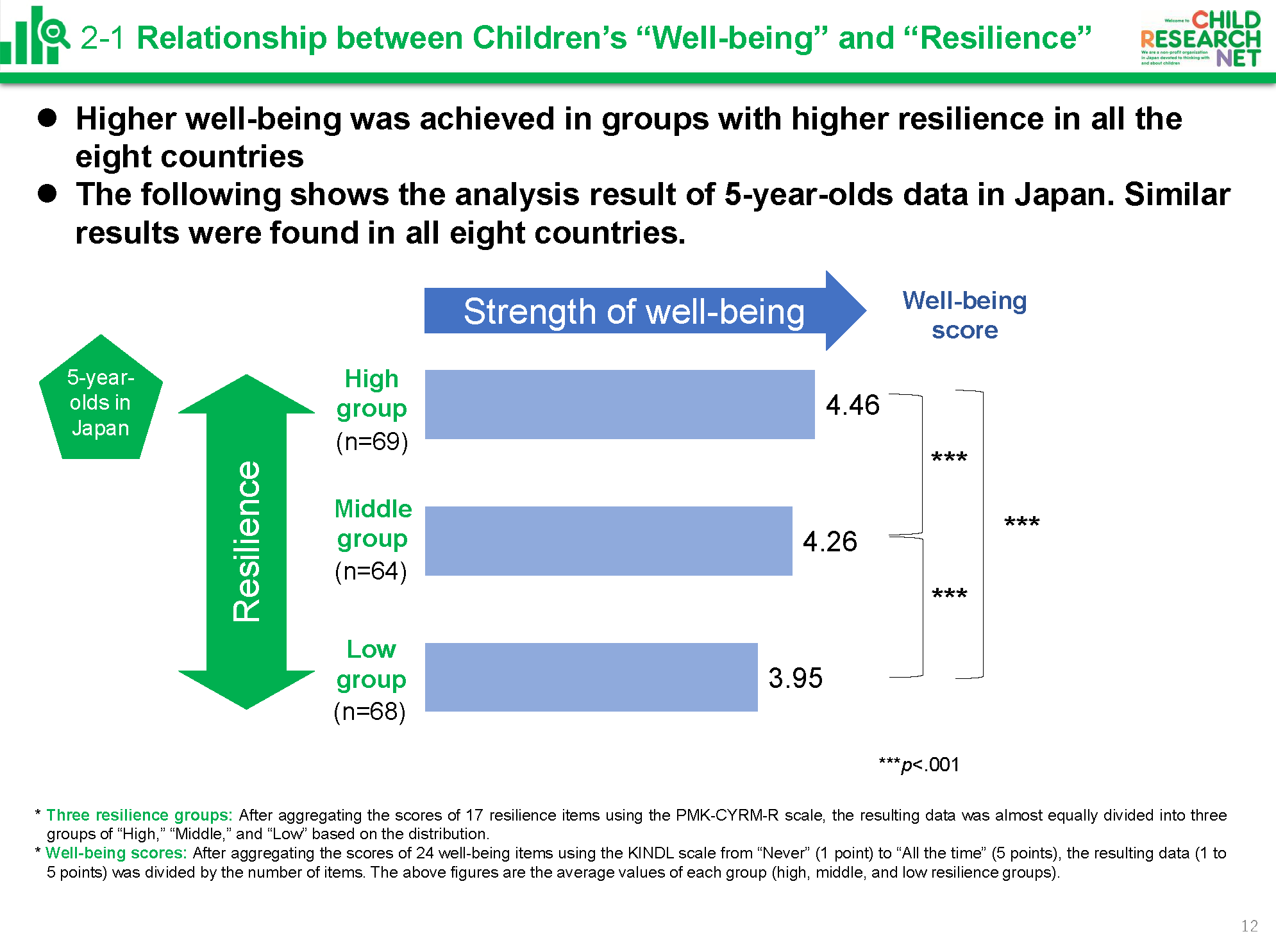
We further examined factors affecting the scores of children's resilience and found that higher scores for the following five factors indicated strong resilience in children:
- Mothers' responsive parenting attitude
- Mothers' childrearing confidence
- Mothers' support when the child is using digital media
- Support from childcare facilities (ECEC teachers)
- Number of friends to play with
In particular, mothers' responsive parenting attitude was strongly associated with children's resilience. Out of the items regarding mothers' responsive parenting attitude, those especially effective in fostering resilience were: "I talk to my child in a warm and gentle manner," "We have physical contact," "I respond to my child's needs," and "I provide an environment where my child can work on what s/he wants to do" (Figure 5).
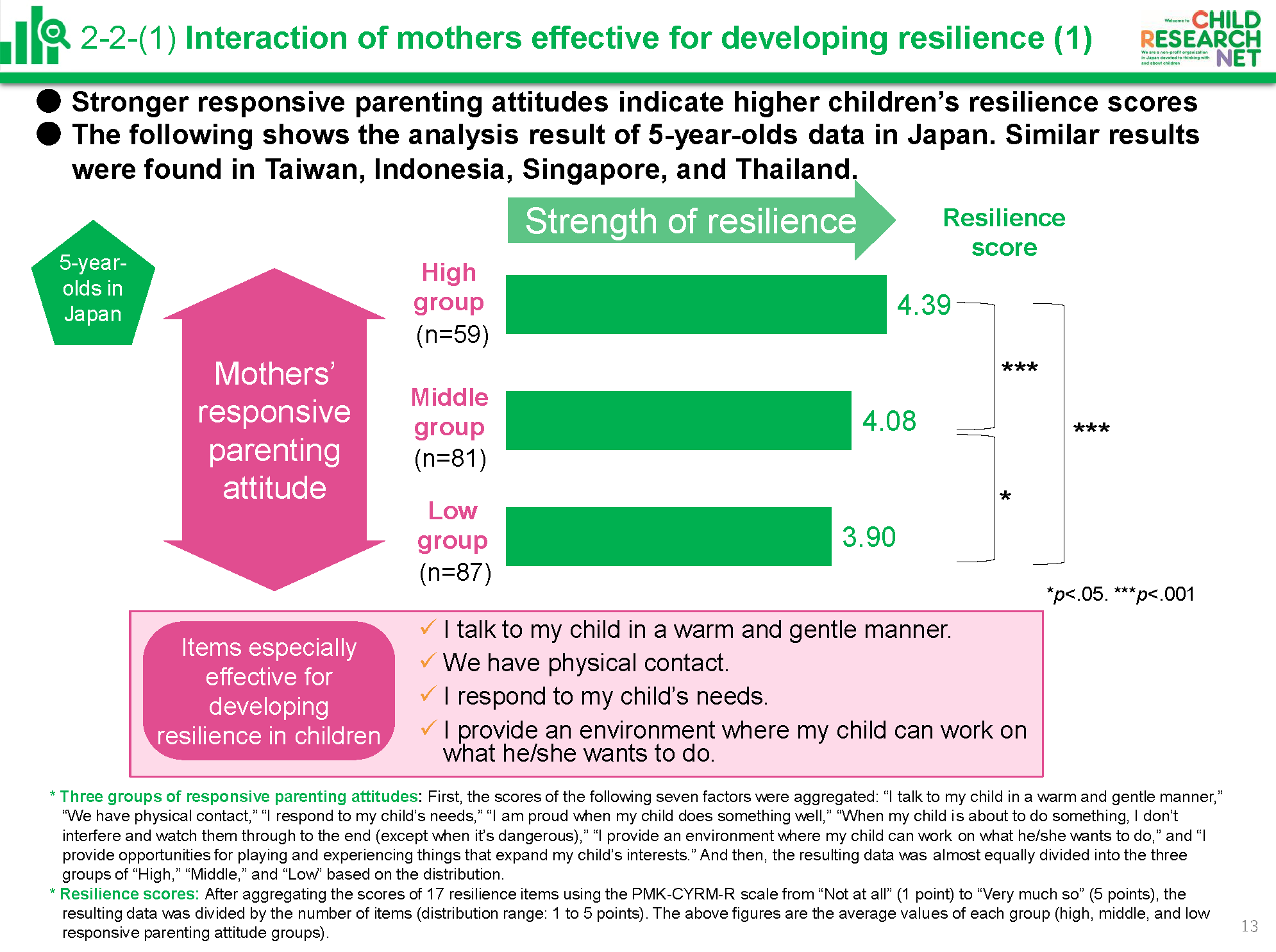
ECEC teachers' support for mothers positively affects children's resilience
Similarly, mothers' support when their child is using digital media enhances children's resilience. More precisely, mothers' supportive and somewhat disciplinary attitudes towards children's digital media use were associated with higher scores of resilience, such as specifying the digital media and contents used and viewed by the child, encouraging the child to decide the time length of use/viewing, and helping the child when working on challenging activities with digital media. We estimate that this may apply to mothers' overall involvement in childrearing, not only in supporting children for digital media use.
Furthermore, support from childcare facilities (ECEC teachers) also affects children's resilience. In particular, not only direct support for children (e.g., "Caregivers/teachers care about the subject child") but support for mothers (e.g., "There are caregivers/teachers whom I can turn to for advice") are also effective in enhancing children's resilience.
What I have discussed so far are the results for five-year-olds in Japan. However, the above factors relating to children's resilience are also significant in other Asian countries (Figure 6).
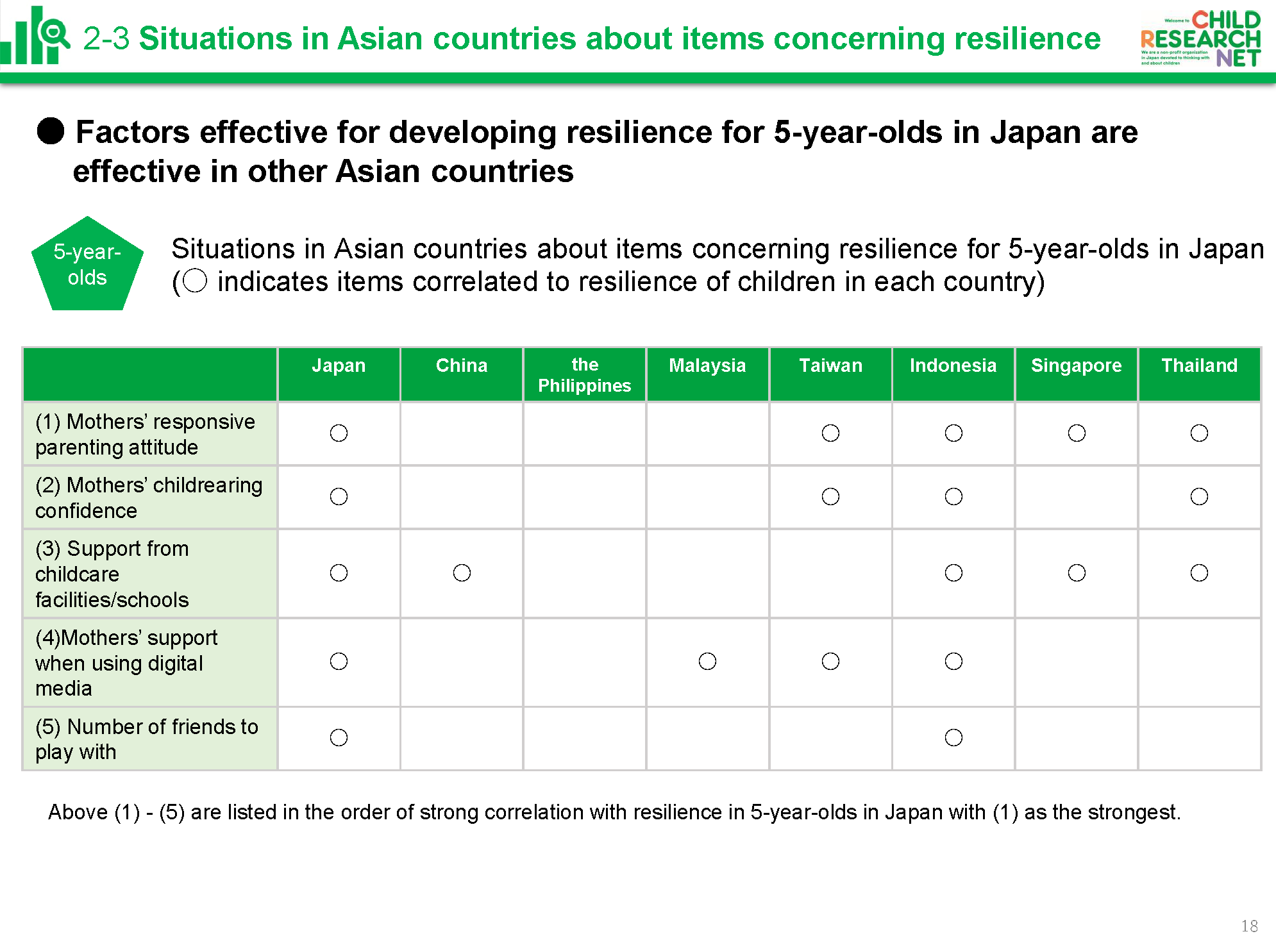
This survey was conducted when Japan was undergoing the fifth wave of the COVID-19 pandemic. At that time, the number of deaths due to COVID-19 increased rapidly across all Asian countries. However, even under such circumstances, the above results were confirmed. This indicates that support from families and ECEC teachers is critically important for the development of children at all times under any circumstances.
[Topic 3]
Focusing on parental involvement in children's use of digital media Tomomi Sato
Tomomi SatoProfessor, Faculty of Human Informatics, Aichi Shukutoku University
Mothers' involvement in children's digital media use is strongly associated with children's resilience
As Researcher Ogawa reported, the analysis results based on the data for five-year-olds in Japan revealed that mothers' strong support for children's digital media use is associated with higher resilience scores. However, the scores of Japanese children are relatively low in the four factors relating to resilience compared to those of children in other countries (Figure 7). One of the possible reasons for this is that Japanese mothers responded to only five out of the 17 items regarding the major purpose of digital media use, meaning that they are not frequently involved in children's digital media use. In addition, Japanese mothers are reluctant to permit their children to use digital media for entertainment and play rather than for studying. Therefore, they may restrict children from using digital media for entertainment and play; thus, Japanese mothers' involvement is relatively less than mothers in other countries.
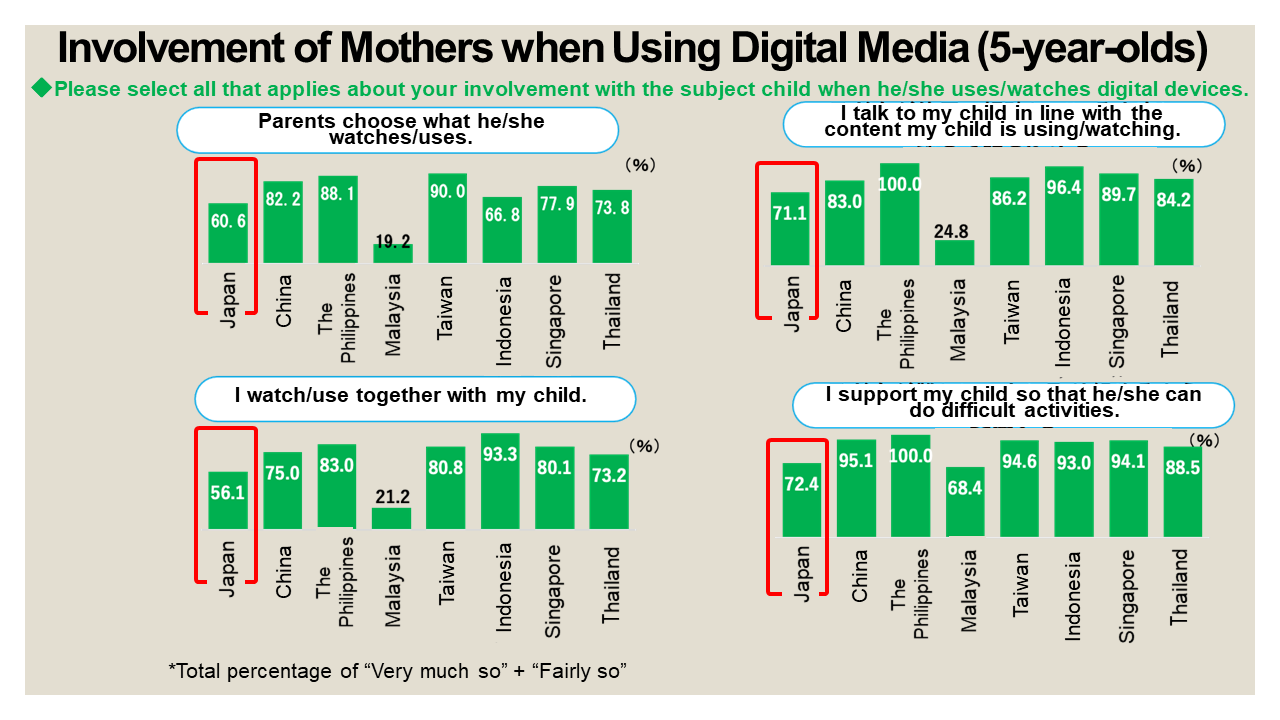
Next, we divided the respondent mothers into three groups in accordance with the degree of their involvement in children's digital media use (i.e., the groups of high, average, and low involvement). As a result of our analysis, the high involvement group indicates that children are using digital media for various purposes. In addition, the scores of children's resilience are significantly high in ten out of 17 items (Figure 8).
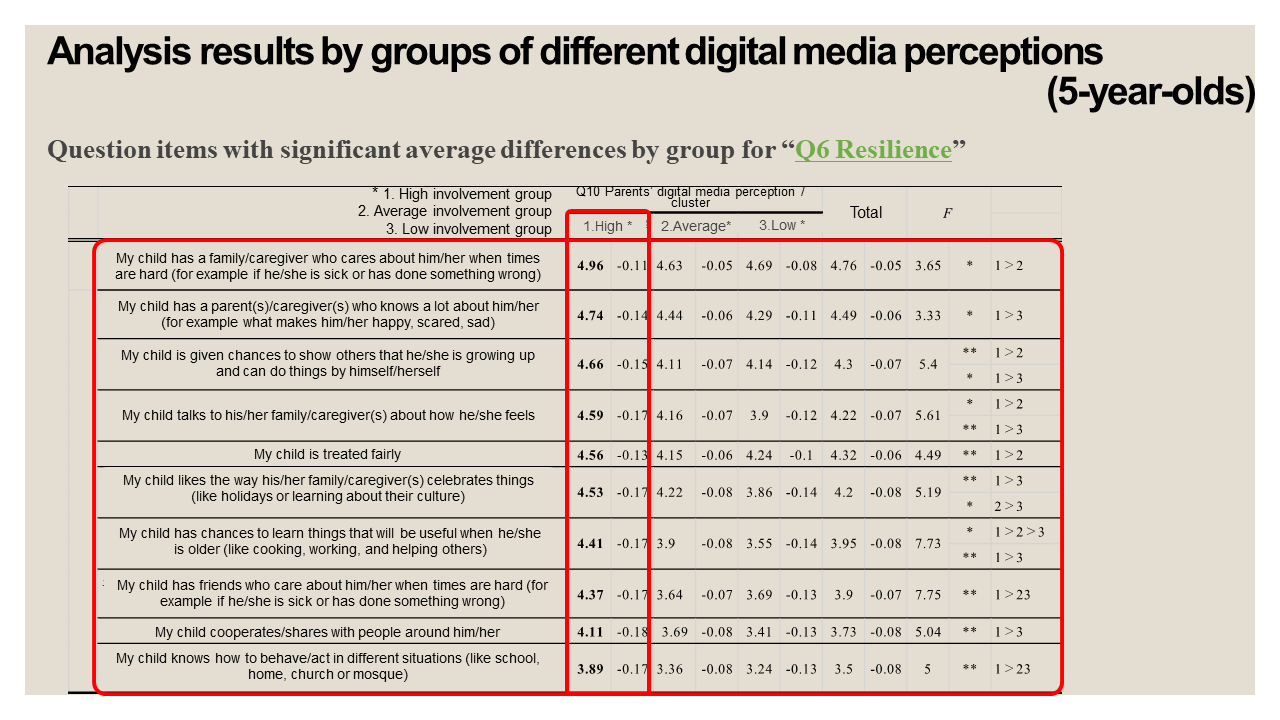
Regarding mothers' parenting attitudes, the high involvement group showed mothers' active interactions with children such as the items of "I am proud when my child does something well" and "I provide opportunities for playing and experiencing things that expand my child's interests," as well as stronger confidence in childrearing.
How should parents mediate children's digital media use?Next, I will introduce the concept of "Parental Mediation (PM)," which has recently become a popular research topic. Previous studies have proposed a specific mediation methodology consisting of "preparative mediation," "administrative mediation," and "creative mediation" (Figure 9).*2 It is pointed out that, along with the advancement of new media and technologies, parental mediation should be further studied to come up with a way that parents can reduce risks and improve the effectiveness of media use for children.
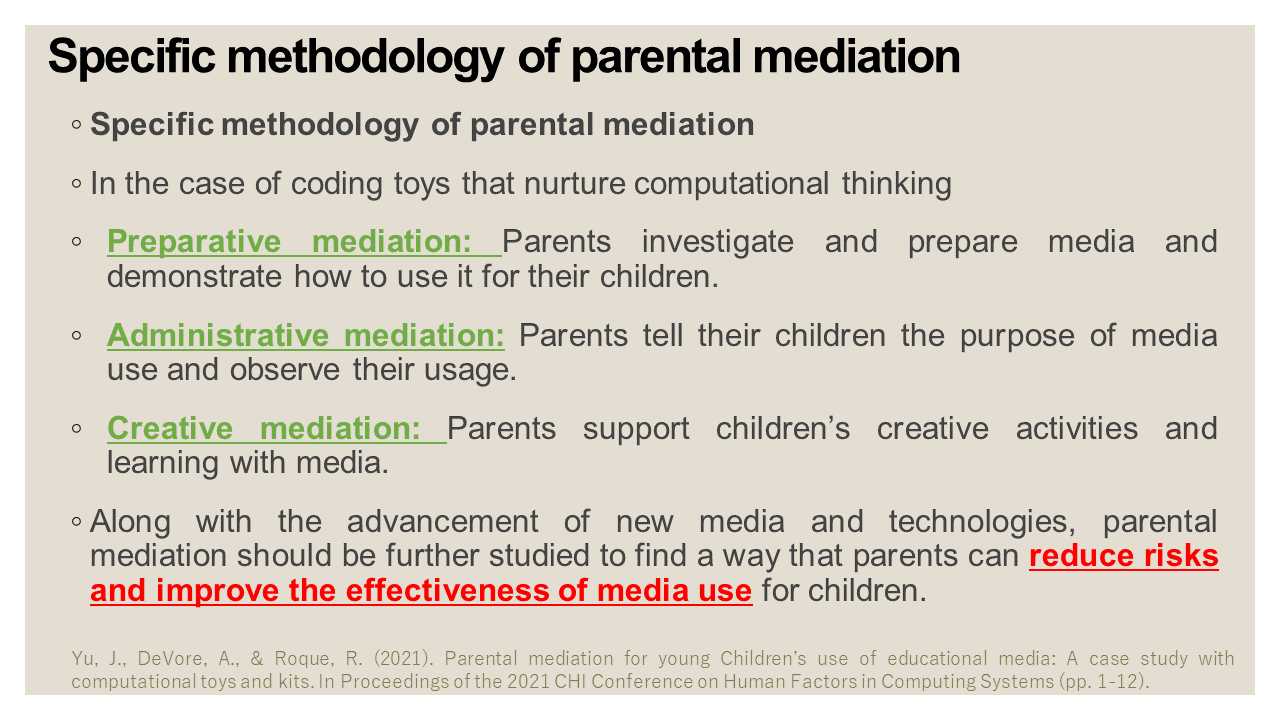
After summarizing the effects of parental involvement clarified by this survey in light of the concept of parental mediation proposed by previous studies, the following parental involvement is critical for the development of children. That is, choosing digital media by carefully checking content (not only entertainment content) (preparative mediation), creating rules for viewing time, etc. and supervising the use of digital media based on the rules (administrative mediation), and searching for answers and solutions for challenging activities together (creative mediation). This approach is well aligned with the OECD Learning Compass and nurtures the ability of children to use digital tools effectively and find solutions on their own.*3
Digital media should be used actively, such as for children's creative activities (pretend play, etc.) and proactive problem-solving, instead of passively viewing videos and playing games. In this regard, parental involvement is vital. Sharing digital time with children will positively affect their resilience. It should be noted, however, that the degree of digital media comprehension may differ for each parent; therefore, improving parents' information literacy is another challenge to address.
[Panel Discussion]
Exploring factors that affect children's resilience and well-being among eight Asian countries Chieko Kibe
Chieko KibeLecturer, Center for Institutional Research, Educational Development, and Learning Support, Ochanomizu University
In this section, I will present my comments and questions on the topics discussed by the three researchers, specifying a keyword for each topic.
Topic 1 Researcher MochidaKeyword: Insight from the collaborative survey among eight countries
Researcher Mochida explained the common factors across eight countries and Japan-specific factors confirmed in the collaborative survey among eight Asian countries. For example, children's well-being was protected through collaboration between their families and ECEC teachers in all eight countries during the pandemic, as childcare facilities functioned as social support. Meanwhile, Japanese mothers' parenting satisfaction is relatively low compared to mothers in other countries, indicating they receive less support from their spouse/partner for childrearing and emotional stability. However, based on the results of multiple regression analysis, it is also pointed out that support from their spouse/partner for childrearing is negatively associated with mothers' parenting satisfaction.
Question: To ensure children's well-being, is there any insight Japanese people can get from the survey results of other countries? Is there any Japan-specific factor that can be utilized for future challenges?
Mochida: There is another research topic on children's physical well-being, which proves children can sleep well if they take exercise for 60 minutes or longer per day.*4 I believe that children in Japan need to play a lot with various friends outdoors, including activities at childcare facilities.
Regarding fathers' participation in childrearing that is negatively associated with mothers' satisfaction, this is partly because mothers maintain "Maternal Gatekeeping" behavior that inhibits fathers' involvement in family work.*5 Nevertheless, the concept of "shared parenting" has been introduced in Japan, and more people think that fathers and mothers should equally shoulder the task of child-rearing. I am thinking of addressing this topic in future research.
Keyword: Prospects for sustainability
Researcher Ogawa explained the ecological model that supports children's well-being, emphasizing their surrounding environment, including their mother, father, childcare facility (ECEC teachers), and friends. In this regard, the "family systems" theory is meaningful in ensuring children's resilience. However, children are not particularly vulnerable or in need of protection. Therefore, as prospects for sustainability, we should learn from the pandemic what children can do to proactively acquire resilience to survive in future society where increasingly rapid changes are predicted.
Question: How should we develop children's agency (independence) when facing difficult situations? What can we learn from our experiences during the pandemic?
Ogawa: Most children have naturally acquired a psychological ability named resilience and were able to adapt to the situation of the pandemic. What is important is how to actualize their resilience. According to another study, it is confirmed that stable daily habits, such as wake-up time and mealtime, improve children's mental health.*6 Therefore, by stabilizing children's daily habits, they will freely and voluntarily act without fear.
Topic 3 Professor SatoKeyword: Sharing information with Generation α
Researcher Sato reported that positive parental involvement in children's digital media use could contribute to their resilience. This viewpoint was found to be beneficial not only during the pandemic but also bodes well for future prospects. The participating children in this survey are called "Generation Alpha," born in 2010 or later. For parents raising digital native children who are naturally familiar with new technologies such as artificial intelligence, information literacy is critically necessary. However, parents are not always able to access the most updated information. Therefore, the perspective of "co-education" is vital for children and parents growing together.
Question: How can we nurture the mindset of parents and children from the standpoint of "co-education"? To build and achieve the OECD Learning Compass, what should we do?
Sato: More studies and offerings for digital content are necessary to enhance parents' ability to leverage information. In addition, parents need to learn how to mediate with children when using digital media and, at the same time, acquire knowledge on security and digital citizenship and convey such knowledge to children.*7
In addition, adults should try the OECD Learning Compass themselves, particularly in this era of the 100-year lifespan. Then, if they can acquire the OECD Learning Compass, they can convey it to their children.

[Question and Answer Session with the Audience]
About the survey method:Question: Please tell us about the method for collecting survey samples. In addition, is there any reason why only the paper version was used in Taiwan?
Ogawa: To conduct an international comparison analysis, we carefully chose samples to maintain a certain level of consistency. Therefore, we discussed and determined with other researchers to collect samples from the middle class in urban or peri-urban areas. As we employed a convenience sampling method, there were statistical dispersions in some countries. Therefore, we cannot say that this survey's results represent each country's actual conditions. Instead, we stated the details of sample attributes. Regarding the survey method in Taiwan, we asked childcare facilities to conduct the survey on our behalf, which is why only the paper version was used.
About the survey results:
Question: Why do Japanese children spend fewer hours, about 30 minutes, on outdoor play than children in other countries? Due to the pandemic, do Japanese parents feel they need to restrict children's outdoor play more than parents in other countries?
Mochida: According to another research project we conducted previously on participants living in the metropolitan area, we found that the number of double-income families was already increasing before the pandemic.*8 Therefore, a large number of parents need to leave their children in childcare facilities until the evening, which is why children spend fewer hours on outdoor play on weekdays, along with the impact of the pandemic.
About future prospects:
Question: After listening to your reports, I really feel that childrearing is not easy in Japan. Please tell us your opinions on the current situation.
Mochida: I agree with you. Another survey revealed that the necessity of leaving children in childcare facilities was increasing, while support from grandparents, siblings, and relatives was decreasing.*9 Therefore, the childrearing environment is becoming challenging for mothers. Some private daycare centers and kindergartens offer enrichment lessons and events for children whose parents are busy during the daytime. Mothers are trying to provide their children with sufficient experiences by choosing such special lessons and receiving limited support from family and relatives. This situation made me think that support for mothers is the most critical factor in ensuring children's well-being. I will continue to carry out research to improve such support for mothers.
Sato: I have been studying children's quality experiences in digital media use, but at the same time, I value the importance of children's interaction with nature. The results of this survey indicated that mothers of children with solid resilience are aware of both factors. However, it is too burdensome for mothers to take responsibility for everything alone. Therefore, I want to seek solutions to support families to ensure children's engagement in digital media and nature without making parents feel overwhelmed or stressed. I think creating such types of environment is necessary for the future.
Ogawa: Mothers' childrearing perceptions seem to be improving. According to the follow-up research conducted in 2022,*10 more mothers chose the answer "Parenting is important, but so is my own life" than the answer "I have to sacrifice my life for my child" compared to the previous survey seven years ago. I am glad that mothers can freely express their thoughts and value both childrearing and their life in the current society. I will continue investigating solutions together with you to ensure ideal child-rearing where mothers can experience personal growth with their children.
- *1 Tsuguhiko Kato, Manami Ochi, Yuko Kachi, Maiko Suto, Miyako Otsuka, and Kenji Takehara. (2022). Review on the influence of paternal involvement in childcare on mothers, children, and fathers. Japanese Journal of Public Health. 69(5), 321-337.
- *2 Yu. J., DeVore. A., Roque,.R. 2021. Parental Mediation for Young Children's Use of Educational Media: A Case Study with Computational Toys and Kits. In Proceedings of the 2021 CHI Conference on Human Factors in Computing Systems (CHI '21). Association for Computing Machinery, New York, NY, USA, Article 475, 1-12.
https://doi.org/10.1145/3411764.3445427 - *3 The compass defines qualities and abilities necessary for children's development, such as "Transformative Competencies" and "Taking responsibility." It proposes the Anticipation-Action-Reflection (AAR) cycle as a catalyst for developing transformative competencies. This cycle is driven by "Agency," the ability to think and act independently.
- *4 Benesse Educational Research & Development Institute. (2022). 2022 Survey Report on Children's Daily Rhythms and Health/Study Habits (in Japanese)
https://berd.benesse.jp/shotouchutou/research/detail1.php?id=5837 - *5 The word "gatekeeping" here means the behavior of a parent who tends to inhibit the partner's participation in family work or child-rearing, saying, for example, "I can do it much better than you, so stay away."
- *6 Laura M. Glynn, Elysia Poggi Davis, Joan L. Luby, Tallie Z. Baram, Curt A. Sandman (2021): A predictable home environment may protect child mental health during the COVID-19 pandemic
https://pubmed.ncbi.nlm.nih.gov/33532520/ - *7 This means the appropriate and responsible code of conduct in using information technologies. In the "Policy Package Regarding Education and Human Resource Development toward the Realization of Society 5.0" published by the Cabinet Office (June 2022), it is argued that the development of such skills is urgently required for children.
- *8 Benesse Educational Research & Development Institute. "Questionnaire on the daily life of young children (2022)" pp.15, 17. (in Japanese)
https://berd.benesse.jp/up_images/research/WEB%E7%94%A8_%E7%AC%AC6%E5%9B%9E%E5%B9%BC%E5%85%90%E3%81%AE%E7%94%9F%E6%B4%BB%E3%82%A2%E3%83%B3%E3%82%B1%E3%83%BC%E3%83%88_%E3%82%BF%E3%82%99%E3%82%A4%E3%82%B7%E3%82%99%E3%82%A7%E3%82%B9%E3%83%88%E7%89%88.pdf - *9 Benesse Educational Research & Development Institute. "Questionnaire on the daily life of young children (2022)" p.4. (in Japanese)
https://berd.benesse.jp/up_images/research/WEB%E7%94%A8_%E7%AC%AC6%E5%9B%9E%E5%B9%BC%E5%85%90%E3%81%AE%E7%94%9F%E6%B4%BB%E3%82%A2%E3%83%B3%E3%82%B1%E3%83%BC%E3%83%88_%E3%82%BF%E3%82%99%E3%82%A4%E3%82%B7%E3%82%99%E3%82%A7%E3%82%B9%E3%83%88%E7%89%88.pdf - *10 Benesse Educational Research & Development Institute. "Questionnaire on the daily life of young children (2022)" p.14.(in Japanese)
https://berd.benesse.jp/up_images/research/WEB%E7%94%A8_%E7%AC%AC6%E5%9B%9E%E5%B9%BC%E5%85%90%E3%81%AE%E7%94%9F%E6%B4%BB%E3%82%A2%E3%83%B3%E3%82%B1%E3%83%BC%E3%83%88_%E3%82%BF%E3%82%99%E3%82%A4%E3%82%B7%E3%82%99%E3%82%A7%E3%82%B9%E3%83%88%E7%89%88.pdf
 Yoichi Sakakihara
Yoichi SakakiharaM.D., Ph.D., Professor Emeritus, Ochanomizu University; Director of Child Research Net, Executive Advisor of Benesse Educational Research and Development Institute (BERD), President of Japanese Society of Child Science. Specializes in pediatric neurology, developmental neurology, in particular, treatment of Attention Deficit Hyperactivity Disorder (ADHD), Asperger's syndrome and other developmental disorders, and neuroscience. Born in 1951. Graduated from the Faculty of Medicine, the University of Tokyo in 1976 and taught as an instructor in the Department of the Pediatrics before working with Ochanomizu University.
 Tomomi Sato
Tomomi SatoProfessor at the Faculty of Human Informatics, Aichi Shukutoku University.
After completing the doctoral course at the University of Tokyo Interfaculty Initiative in Information Studies Graduate School of Interdisciplinary Information Studies, she worked as an assistant professor at the University of Tokyo III and then lecturer at the Faculty of Human Relations, Department of Child Development, Tokai Gakuin University. She is engaged in research studies on educational technology, preschool education, and learning environment design. She also serves as director of the Japanese Society of Child Science. She has been awarded the 5th Kids Design Award for an online community application called “Oyako-de-Monogatari,” the 8th award for the “Workshop of Making a Video Letter for the Future Child,” and the 11th award for a smartphone application called “Family Portfolio” promoting family interactions.
 Chieko Kibe
Chieko KibeLecturer, Center for Institutional Research, Educational Development, and Learning Support, Ochanomizu University Ph.D. (Psychology). Graduate School of Humanities and Sciences, Ochanomizu University M.Sc. (Applied Positive Psychology) University of East London
Board member of Japan Positive Education Association.
Areas of Research Interests: Positive Psychology, Developmental Psychopathology, Developmental Psychology, Clinical Psychology.
Major publications: Teaching Well-Being and Resilience in Primary and Secondary School. In S. Joseph (Ed.), Positive Psychology in Practice, (Chapter 18) Wiley 2015. Positive Psychology for Kids. Japan Positive Education Association (Ed.), Godo Shuppan 2017.
 Seiko Mochida
Seiko MochidaResearcher at Child Research Net (CRN) and senior researcher at the Benesse Educational Research and Development Institute.
She conducts surveys and research studies on families from the perspective of ordinary people, such as changes in their perceptions and living styles when they start a family and have children. She specializes in industrial/organizational psychology and developmental psychology. Her main research articles include “Research on Prenatal/Postnatal Life and Support for Mothers and Current Situation” (2015), “International Survey on Family Education in Early Childhood” (2016-2017), “Basic Survey on Children’s Education and Childcare” (2018), and “Survey on the Impact of the COVID-19 Pandemic on the Daily Life of Preschool and Primary School Children” (2020).
 Junko Ogawa
Junko OgawaChild Research Net (CRN) Researcher, Benesse Educational Research and Development Institute (BERD) Researcher
She was assigned to the Benesse Educational Research and Development Institute (BERD) in 2013, managing Child Research Net (CRN). Recently, she established the Child Research Network Asia (CRNA) through collaboration with researchers from Asian countries. She is currently working on a collaborative international survey with researchers from eight Asian countries.
- Children's Well-Being and Resilience during the COVID-19 Pandemic [Part I] What is resilience?
- Resilience Study Session Report: How to enhance children's resilience, essential for their well-being
- Press Release on "Survey on Children's Daily Life among Eight Asian Countries 2021": Development of "Resilience" is Important for Children's Wellbeing during the Covid-19 Pandemic
- [CRNA Collaborative Research] Survey on Childcare Practices Nurturing Resilience in Children 2024 Result Report
- [Japan] Practices and Backgrounds for Nurturing Social-Emotional Skills and Resilience in Early Childhood Education and Care in Japan
- [Indonesia] ECE Teachers' Perception and Promotion of Children's Resilience and Social Emotional Skills in Indonesia














